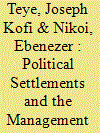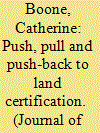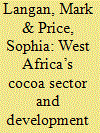|
|
|
Sort Order |
|
|
|
Items / Page
|
|
|
|
|
|
|
| Srl | Item |
| 1 |
ID:
153648


|
|
|
|
|
| Summary/Abstract |
Ghana, like other African countries, suffers a huge infrastructure gap. In recent times China has become a major bilateral source of investment in Ghana’s energy infrastructure. This article examines the strategic importance of Chinese infrastructure investment in Ghana’s energy sector in recent times. The study is based on field research conducted by the author in Ghana and on the analysis of semi-structured interviews with Ghanaian policy makers, journalists, civil society organizations, academics and individuals. Additional data were collected on some key projects China has been sponsoring in the energy sector. The paper suggests that China has become a key partner in Ghana’s development efforts as its provision of infrastructural projects soars and its involvement in Ghana’s economy grows. Yet China’s engagement presents a complex dynamic given its dual role as financier of energy infrastructure and at the same time a competitor or seeker of Ghana’s oil and other natural resources.
|
|
|
|
|
|
|
|
|
|
|
|
|
|
|
|
| 2 |
ID:
193019


|
|
|
|
|
| Summary/Abstract |
This paper relies on literature review and primary data collected through in-depth interviews with 21 respondents to examine the political economy dynamics of the cocoa value chain in Ghana. The historical analysis, which was based on the political settlements framework, has shown that the policies implemented in the cocoa sector went through four periods. The colonial era was characterised by a fairly corporate governance system and struggle between European traders and farmer cooperatives for monopoly over internal marketing of cocoa. This was followed by the early post-independence era (1957–1980), which was characterised by neopatrimonialism and over-taxation of cocoa farmers. The third phase (1980–2000) witnessed economic reforms and liberalisation. The fourth phase (2000 to present) saw increased public–private partnerships aimed at empowering women and promoting environmentally friendly farming activities. The paper concludes that the policies in the cocoa sector have, historically, created more benefits (rents) to political elite and their crony capitalists. Given that rent-seeking behaviour is a threat to the sustainability of the cocoa sector, the paper urges international development partners and civil society groups to demand greater accountability and transparency from the political elite and state institutions in the cocoa sector.
|
|
|
|
|
|
|
|
|
|
|
|
|
|
|
|
| 3 |
ID:
180256


|
|
|
|
|
| Summary/Abstract |
Since 2000, many African countries have adopted land tenure reforms that aim at comprehensive land registration (or certification) and titling. Much work in political science and in the advocacy literature identifies recipients of land certificates or titles as ‘programme beneficiaries’, and political scientists have modelled titling programmes as a form of distributive politics. In practice, however, rural land registration programmes are often divisive and difficult to implement. This paper tackles the apparent puzzle of friction around rural land certification. We study Côte d'Ivoire's rocky history of land certification from 2004 to 2017 to identify political economy variables that may give rise to heterogeneous and even conflicting preferences around certification. Regional inequalities, social inequalities, and regional variation in pre-existing land tenure institutions are factors that help account for friction or even resistance around land titling, and thus the difficult politics that may arise around land tenure reform. Land certification is not a public good or a private good for everyone.
|
|
|
|
|
|
|
|
|
|
|
|
|
|
|
|
| 4 |
ID:
171245


|
|
|
|
|
| Summary/Abstract |
The EU is vigorously pursuing Economic Partnership Agreements (EPAs) in its trade and aid relations with African, Caribbean and Pacific (ACP) countries. Justifying the EPAs as being ‘development friendly’, EU officials promise that aid support to private sector development (PSD) in ACP countries will make free trade systems ‘win–win’. This article, based on the authors’ semi-structured interviews conducted in Ghana and Nigeria, examines the perspectives of cocoa stakeholders vis-à-vis EPAs and PSD. Applying critical discourse analysis to interview transcripts, it underscores areas of overlap and, crucially, divergence among cocoa stakeholders’ own narratives on PSD support in the context of EPAs and the official legitimating discourse of EU institutions. In the process, the article draws critical attention to cocoa business interviewees’ concerns regarding the impact of premature trade liberalisation. It also underscores cocoa stakeholders’ concerns that EU PSD promises are not being fulfilled in terms of actual tangible benefits for business people in this vital ACP export sector. Accordingly, the article contributes to, and corroborates, an existing critical scholarly literature which problematises the strategic functions of donor PSD discourse in presenting free trade reforms as being ‘pro-poor’ in the post-Washington Consensus.
|
|
|
|
|
|
|
|
|
|
|
|
|
|
|
|
|
|
|
|
|